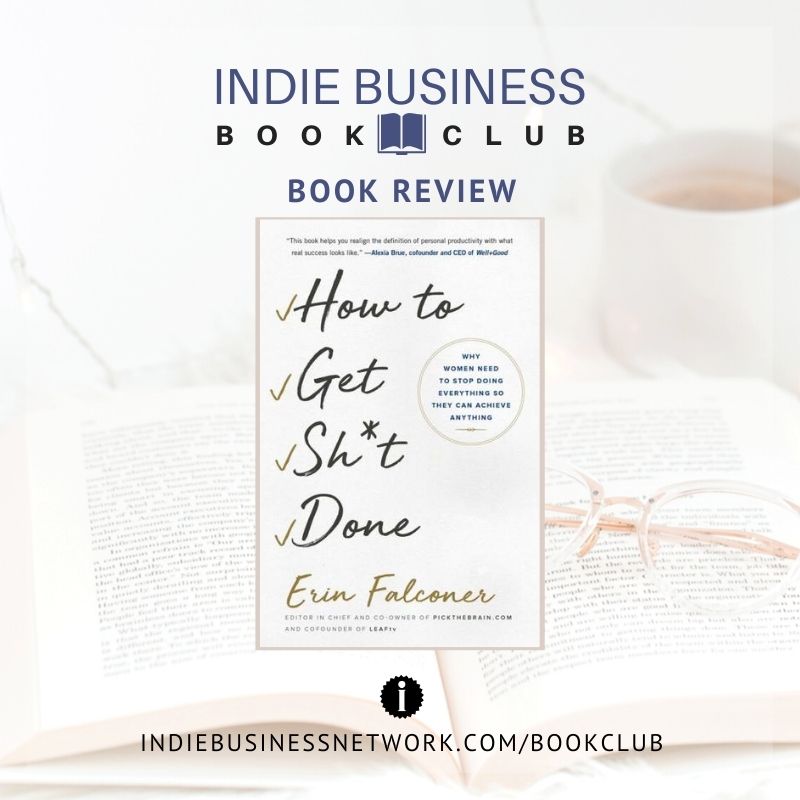For the August 2020 edition of the Indie Business Book Club, we read How to Get Sh*t Done by Erin Falconer. In promotional materials, this book is touted as the the first productivity book by a woman in a decade. (It was published in 2018.) The book calls on women to stop configuring the exhausting lives we always complain about, and start being more focused and intentional about doing only those things that really matter to us. This is a tall order for achievers, which most entrepreneurs tend to be, but we are up to the challenge!
If you're not familiar with the Indie Business Book Club, you can click here for more information.

Summary
A lifelong overachiever, Erin Falconer tackles the cultural pressures women experience to achieve in work and in life, often at the expense of their health and well-being. Among other things, Falconer suggests always leaving work at work, setting three (and only three goals per year), and delegating every single thing you do not absolutely have to do yourself. Let's unpack some of this.
Highlights from How to Get Sh*t Done
Here are some of my favorite highlights from the book.
1. Set 3 (and only 3) annual goals.
Instead of striving to do “all the things,” Falconer suggests focusing on 3 (and only 3) annual goals, and then either ditching or postponing the rest. The idea is to stop doing things other people think you should do, and zero in on what you really want to do. Making this choice, according to the author, will ultimately make you happier. Additionally, importantly, you'll become more productive without killing yourself to please others.
Once you choose your goals, work backward to determine what needs to be done, and when, in order to meet those goals.
Personal application
Here's a confession. I generally set 7 or 8 goals per year, and only achieve half of them. Maybe as Falconer says, setting 3 at the outset makes more sense. I'll see how that works for the rest of this year and starting the next one.
2. Re-evaluate how you approach sleep.
Falconer suggests that sleep should not be that thing we do when we have finally finished everything we can think of doing for the day. Instead, sleep should be something we schedule at the same time every night, as this is the best way to set yourself up for a productive next day.
She does not suggest that you be motivated to go to bed at a regularly scheduled time in order to get more done. She suggests you do it in order to get more of the right things done.
Personal application
This one is hard for me. (Whine whine whine.)
I work hard and steadily pretty much all day, and when I'm done, the last thing I want to do is have another deadline. Setting the same bedtime to me is like another deadline, and I generally rebel against those unless they are work related. Why can't work have deadlines and personal life ebb and flow more freely?
As I whine about this issue, I also hear the words of a pharmacist in one of my mastermind groups, reminding all of us that one of the best way to increase productivity without working more and killing yourself is to go to bed at the same time every night. (Why can't I be right about something, for once?) The question is, will I will listen?
3. Say “No” more
This is not new advice, but it bears repeating. Don't say “Yes' to anything this is not a priority for you.
4. Use your time wisely.
This was my favorite sections of the book, Chapter 7, especially the part about how to break down a big goal into smaller manageable pieces to actually get it done. Watch this short video summary of the chapter to see what I mean.
Who should read How to Get Sh*t Done?
If you have trouble getting “it all” done, you are probably trying to do too much. You are also probably focused on doing lots of things just to cover your bases or to save yourself from actually having to decide what is most important. Does that sound familiar? If so, reading this book is probably a good choice for you.
Buy How to Get Sh*t Done
Buy this and other Indie Business Book Club picks at IBN's Amazon shop.
Feedback and Share
Did you read along with us? What do you think of this book? Do you have a tendency to try to do too much? Are you focused on getting stuff done just so you can have a bunch of check marks next to your “do to” list? Are you exhausted and feeling like there aren't enough hours in the day?
And I really want to know if you have a specific bedtime every single night. I still don't know if I could discipline myself to do that. Maybe I'll try it as an experiment and see how things go.
Did the principles in this book help you move past the overwhelm so you could focus on accomplishing the tasks that are most important to you? Please share your comments and feedback below.



